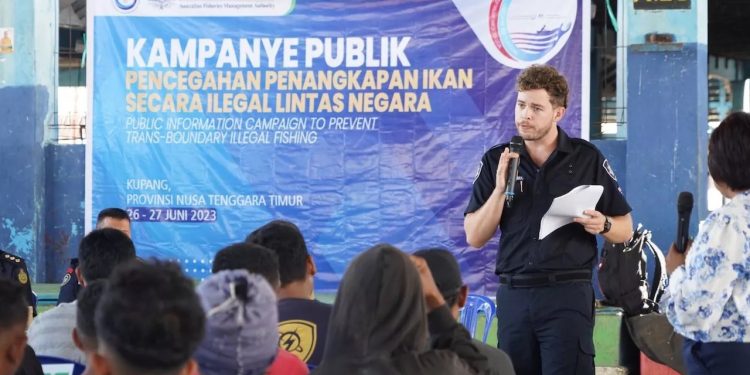Fishery Officers from the Australian Fisheries Management Authority (AFMA) informed more than 180 Indonesian fishermen of the dangers of illegal fishing in the Australian Fishing Zone, in a series of educational workshops as a part of a bilateral partnership to stop illegal fishing at its source.
The educational workshops encouraged fishermen, their families, and the wider fishing community to make better choices by helping them understand the maritime boundaries and legal consequences of illegal fishing, as well as the risks to personal safety and environmental damage caused by illegal fishing.
The educational workshops were held in three major fishing ports in Kupang in the East Nusa Tenggara region of Indonesia, where fishermen are at high risk of engaging in illegal fishing due to its proximity to the north-west of Australia.
In 2022, AFMA held two educational workshops on the Indonesian island of Rote. In total, more than 450 Indonesian fishers have been engaged in the information campaign.
Australia’s Ashmore Reef Marine Park, Cartier Island Marine Park, and Kimberley Marine Park including Rowley Shoals, are particularly vulnerable to illegal fishing due to the shallow reef systems and high biodiversity.
According to AFMA, following the Cocid-19 pandemic, there has been a notable increase in Indonesian fishing vessels intercepted for unlawful fishing inside the Australian Fishing Zone. This increase in illegal fishing is attributable to social and economic pressures on Indonesian fishers as a result of the pandemic among various other factors, including the high market value for some species, such as sea cucumber.
Australia and Indonesia have a long history of working together to deter illegal fishing. AFMA and Indonesia’s Directorate General of Surveillance for Marine and Fisheries Resources (PSDKP), with support from the Department of Agriculture, Fisheries and Forestry and Australian Border Force collaborated to coordinate and deliver the educational workshops.
AFMA implements a range of activities to address illegal fishing under its International Compliance and Engagement Program. This program includes a range of activities including communication efforts, enforcement operations, strategic engagement, capability development, and targeted threat responses.









